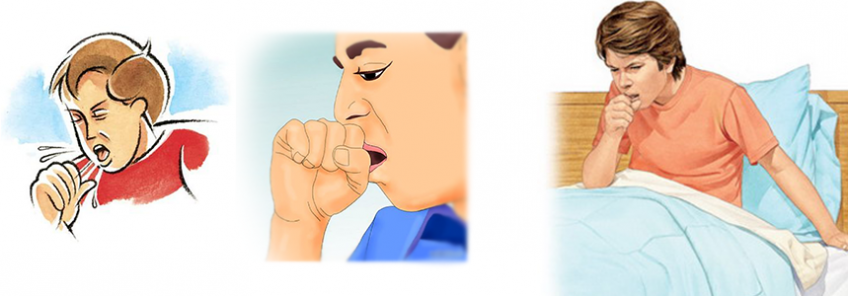Cough

Cough is our body’s protective response to the presence of irritants in the airway. It is a reflex action caused by the stimulation of the nerve endings in the respiratory tract by stimuli such as allergen, microbes, foreign body or excessive mucous. After the stimuli reaches the brain, the brain sends impulses to the muscles of chest and abdomen to contract forcefully in an attempt to expel the irritant. Cough is produced by sudden indrawing of air with the glottis (part of upper airway) wide open followed by a blowing out of air against a closed glottis. A forceful cough can generate a velocity of up to 500 miles per hour.
Cough can be a ‘dry cough’ without sputum production or a ‘wet/productive cough’ with sputum production. Most of the disease causing cough are of acute in nature and resolve within three weeks. When cough persists for more than 8 weeks, it is called a chronic cough and has a slightly different causes and diagnostic modalities than acute cough.
Common Causes
Acute cough: Infection of the respiratory tract are the common cause of acute cough:
- Acute bronchitis/laryngitis/tracheitis
- Pneumonia
- Common cold ( respiratory viral infections)
- Pulmonary tuberculosis (infection of the lungs by Mycobacterium tuberculosis characterized by chronic cough and blood in the sputum)
- Whooping cough or pertussis (highly contagious respiratory tract disease characterized by coughing spells).
- Croup syndrome in children (group of diseases characterized by swelling, and partial blockage in the entrance of the larynx which causes cough).
- Acute Sinusitis
- Inhalation of an irritant ( chemical and fumes)
- Foreign body inhalation
- Pneumothorax (collection of the air in the pleural cavity)
- Heart failure
Chronic Cough
- Chronic lung disease like
- Chronic obstructive pulmonary disease (COPD).
- Asthma
- Bronchiectasis
- Lungs cancer
- Gastroesophageal reflux disease (GERD)
- Chronic sinusitis/ Post nasal drip
- Medication- Angiotensin converting enzyme inhibitor/ACEI like Enalapril, used to treat high blood pressure
- Others: Tuberculosis, Sarcoidosis, lung fibrosis
When to visit the Doctor?
Prompt medical treatment should be sought if cough is accompanied by:
- Hemoptysis (coughing up blood)
- Night sweats
- Fever
- Weight loss
- Difficulty in breathing or noisy breathing
- Coughing spells
- Chest pain
Diagnosis
- History and Physical exam by Physician, followed by one or more of tests like-
- Chest X ray
- Blood and Sputum test
- Lung function test
- Allergy skin test
- CT scan of chest
- Bronchoscopy (endoscopy of airways)
Treatment Options
Cough is only a symptom of an underlying disease, so treatment is directed at its cause.
- Bacterial respiratory tract infections are treated with antibiotics.
- COPD and Asthma are treated with bronchodilators (inhalers)
- Oxygen therapy when blood oxygen level is low.
- Stopping medicine like ACEI when they are causing cough.
- Acid reducing medicine for acid reflux.
- Avoiding irritants, smokes or removing foreign body
- Treatment of tuberculosis, heart failure or lung cancer
- Drainage of infection, fluid or air collected around the lungs
- When no cause is found, cough suppressants can be used.



Send us your feedback on this article